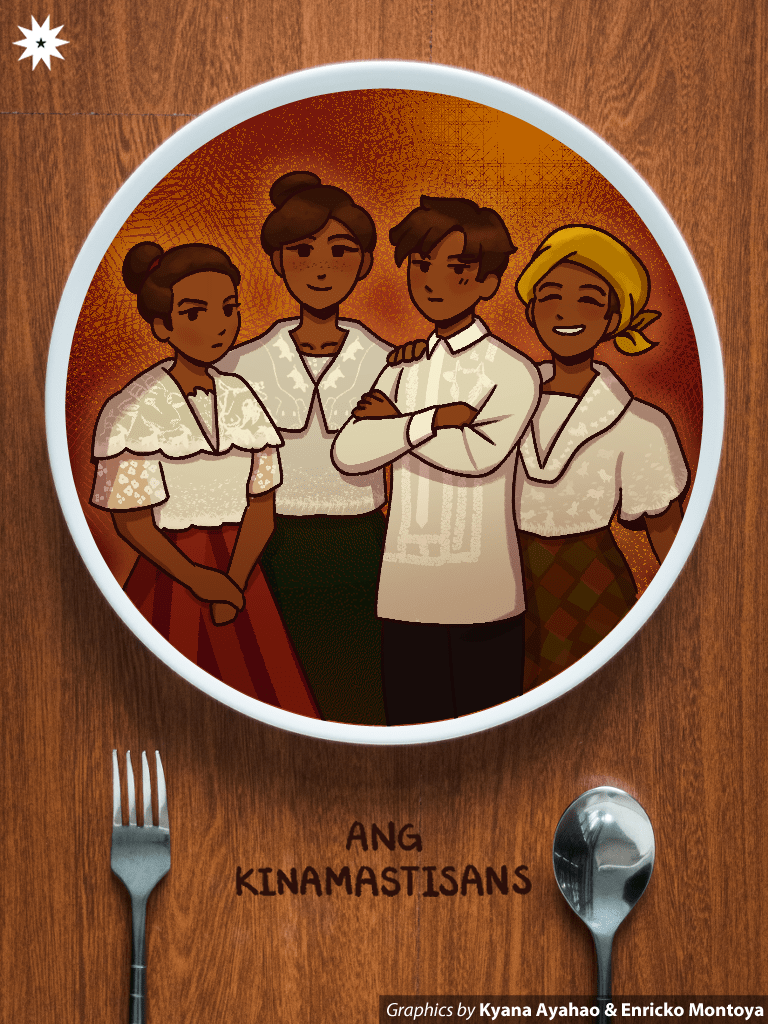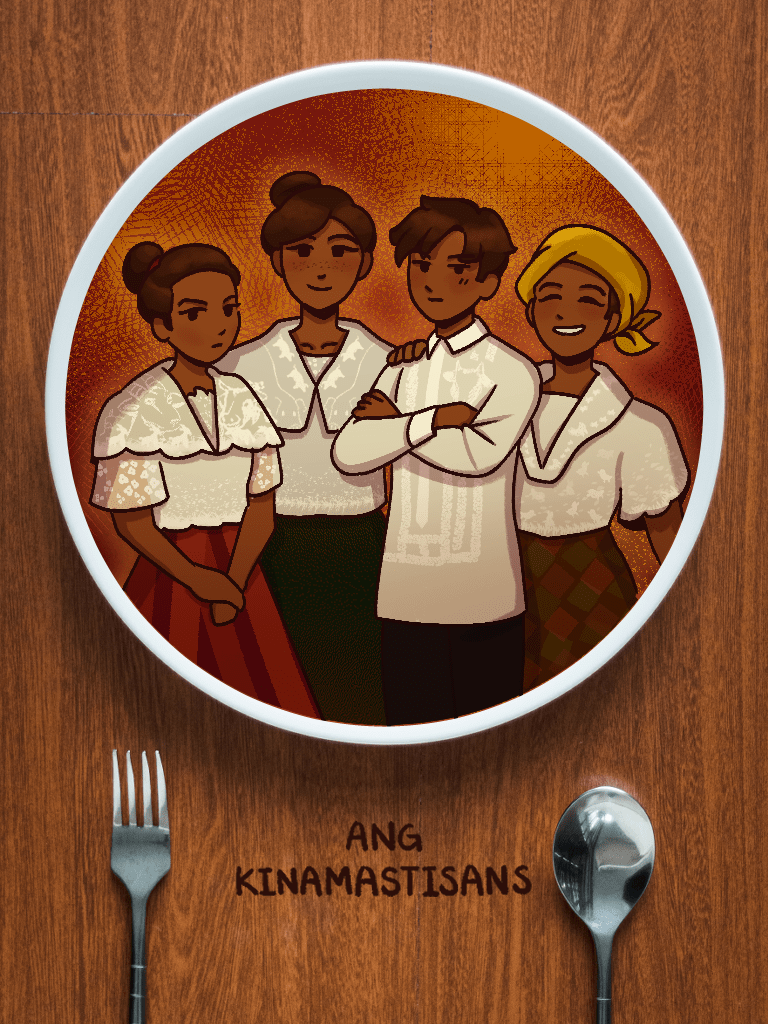Dynasty—a lineage that rules with power and wealth.
This is what the Kinamatisans, also known as the Kinamatisibs, are known for as astounding young individuals who have mastered an array of fields. With Manu Daux, the owner of several Michelin-starred restaurants; Calli Reyta, the couture supermodel of the generation; Afri Tada, an Oscar-winning actress; and Mel Chado, Forbes’ Person of the Year 2021, there’s no way one hasn’t heard of these quadruplets.
But before they conquered the world with their Kinamatisan power, they barely knew of each other’s existence. Separated at birth, these siblings were scattered across the world and became seasoned professionals at their crafts.

Blindsided by happenstance
Five years ago, the then-rising Tada made international headlines for mentioning she shared the last name with Reyta. “My first thought was, ‘How dare she use me to jumpstart her career?’ Second of all, I always use my stage name and I know Kinamatisan isn’t a common last name ‘cause I only know me and Mamá as the only ones blessed with [those names].” However, when she asked her mother regarding the news, “Mamá had no response; and she always reacts to me. So I started getting suspicious if there was truth to what Tada was saying.”
Indeed, the model furthers by saying she was invited by their mom to a grand dinner as soon as the news broke. Upon her arrival, however, she didn’t expect to see Daux, Chado, and especially Tada, all of whom looked similar to her. “It looked like that Spiderman meme, but with more tension,” Tada jokes. “There were so many things we wanted to say to each other, but Mamá welcomed us as if nothing was wrong.”
Reyta says they tried to ease into the discussion; however, further details that their mother has always been extremely secretive about the past. “We all grew up living in the houses of Mamá’s good friends rather than in Mamá’s [private] estate. Never kami naging close sa mga kamag-anak ni Mamá [because] she didn’t like talking about them,” Daux explains, claiming they didn’t push certain topics with her as they grew up. Only after hours of incessant pleading did their mother finally reveal the truth of their family situation.
(We were never close to Mama’s relatives.)
All were raised to believe they were single children; the shock was understandably translated into fiery emotions and harsh words. They detested the idea of three Kinamatisans sharing their mother’s love. But none of them could bear to point their sharp tongues at the matriarch, so they sought to cut deep into each other instead. “I vaguely remember telling Tada that she was the ugly version of me,” Reyta remarks. Unable to stand the fighting anymore, their mother gave them all the sermon of their lives, ordering them to suck it up and get along or she’d refuse to see any of them ever again; thus started the Kinamatisib’s journey to true siblinghood. But of course, flavors always need time to get to know each other.
Stirring the pot
The process of becoming a family was arduous and stilted at times, but not for lack of effort on anyone’s part. An endorsement deal with Maggi Magic Sarap prompted a trip to the beach during the early days of the Kinamatisibs’ reconciliation. The siblings bonded over their love for food and saw it as an opportunity to differentiate themselves from each other. But things soured fast.
Ever the dramatic one, Reyta amped up her usual spice after losing her diamond earrings in the sea. Her personality tends to clash with Chado’s snarky, almost salty attitude. The two engaged in a shouting match that was audible even from the island across. “She was stalling. There are people dying in the world, people with actual problems in life,” he asserts. Meanwhile, as the mellower duo of the bunch, Daux and Tada wandered off without a care in the world and conversed with some locals. Nearly four hours of production were lost.
They had their moment later at dinner, however, when Daux requested garbanzo in her dish. The memory is enough to make Tada grimace. “We agreed to share some food with each other, but Manu made that request despite knowing I’m allergic,” she exclaims. While she didn’t ingest any of it, their sparring landed them in the emergency room anyway.
But their extremely identical looks almost cost the Kinamatisibs another trip to the hospital—with nurses almost injecting Reyta with an EpiPen believing she was Tada. From that moment on, they decided on a plan to make them stand out from one another. “Once this article is released, we’re going to launch an international press campaign to announce our branding differences,” Daux excitedly shares. While specific details are still murky as of press time, they hint that they will be wearing single-colored clothing to match their favorite foods: “To honor her love for spice, Calli will be wearing more red, Afri will wear more green ‘cause peas are her life, Manu’s planning to wear yellows to satisfy her garbanzo fix, and I plan to wear a lot of brown because who doesn’t love their soy sauce?” Chado confirms.
New beginnings
Surprisingly enough, the Kinamatisibs made peace with their mother before doing so with each other. “To tell you the truth, I don’t think even Mamá remembers why she separated us at birth,” Daux jokes. “She’d give a different answer every time [we’d] asked, from birthing the children of a crime mob kingpin to immaculately conceiving four times.” They eventually stopped pushing for a real answer. Besides, they were at each other’s throats for most of that time.
After years of tears, hate, and self-discovery, the siblings eventually realize that the essence of being a Kinamatisan is by celebrating their similarities. Their relationship may not be ideal at the start, but their bond grew into something more. Tada beams, “When we finally came to our senses, we realized that we each had three people to confide in during the lowest point of our lives. We all felt less alone throughout the ordeal and wanted to leave it behind us hand-in-hand,” she explains.
Making up for the lost time is all they can do now. The Kinamatisibs constantly book dinner reservations, go on family vacations, and engage in retreats and extensive group therapy sessions to create memories that will last a lifetime. Whether or not the future constitutes more food, tears, and shrinks, at least they have each other.



